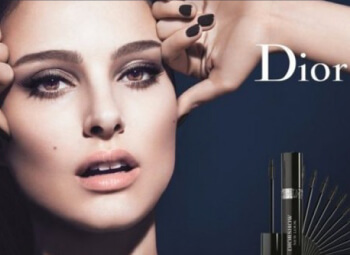It’s always mystified me that mascara print ads show models who are obviously wearing either a strip of false lashes or individual false lashes. Go it one better, when graphics departments digitally enhance lashes to make them look long and lush and, amazingly, just like the lashes we all want to have, too.
P&G’s Cover Girl brand admitted to doing the bad thing in 2011 in an ad starring Taylor Swift. Yes, the ad’s fine print ‘fessed up, but the ad was eventually pulled. Cover Girl is not the only offender, according to a well-reported piece in the Los Angeles Times, which points the finger at cosmetics companies L’Oreal, Dior, Maybelline and Lancôme. Rest assured there are more.
Earlier this year a Photoshop retoucher confessed that “I do work on a lot of cosmetics images, too, and the mascara ads are just ridiculous.”
Nothing new

If you’ve been wondering when someone might blow the whistle on companies that tell tall beauty tales, the Times says it’s happening, although not with the frequency we might expect. These agencies are on the case:
- Food & Drug Administration (FDA): Sent a warning to Lancôme questioning whether some of the company’s anti-aging products aren’t really drugs, and if so, shouldn’t they go through the same exhaustive, expensive testing processes as medications? That could throw a real wrench into the entire anti-aging product category.
For example, proponents of more regulation say a company should present “the literature,” i.e., research or studies that show who was tested, with what, for how long and what the results were—both good and bad. That’s what medications must report, so why not a cream that promises a 10 percent improvement in “youthfulness” of your skin?
- National Advertising Division of the Council of Better Business Bureaus: Was behind the Cover Girl/Taylor Swift ad cancellation.
- British Advertising Standards Authority: The mother country doesn’t take this matter lightly and has reprimanded those cosmetics behemoths listed above. It banned the ad above.
We asked for it
Of course, let’s give credit where credit is due. To quote from the Times article: “The main reason why lies succeed is because the target doesn’t want to know the truth,” says psychologist and author Dr. Paul Ekman. “We’re all in collusion with advertisers, unwittingly, because we’d like to believe that products do what they claim.”
So if I as a baby boomer woman buy that bottle of (XXXX), I will immediately look younger, stop forming wrinkles, and find fame and fortune—just like that model? Of course I will—won’t I?
The aforementioned retoucher says we women wouldn’t like it any other way: “If we stopped doing that now, you’d flip through your magazine and say, oh my God, honey you need to put on some makeup. To stop doing it now would be so noticeable.”